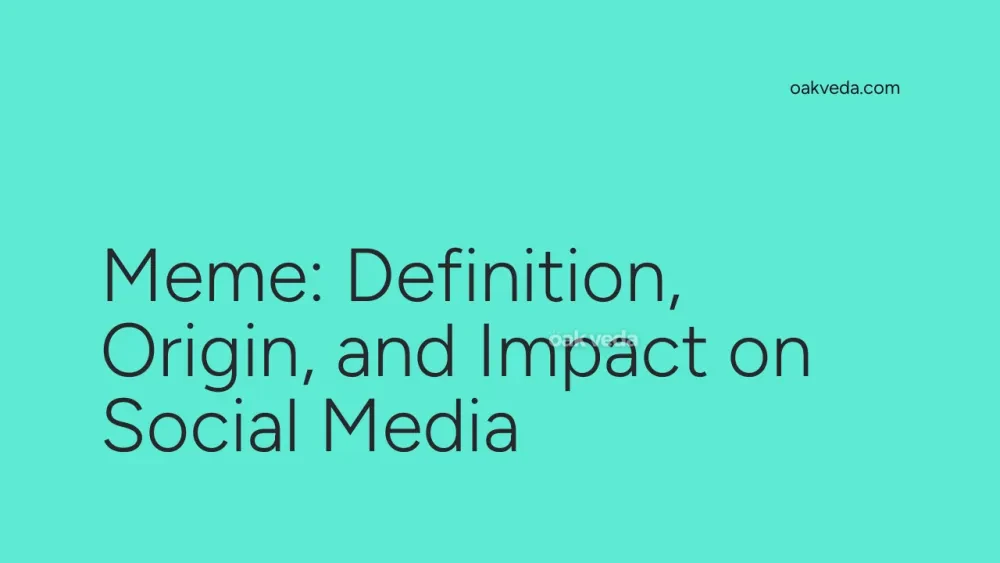
What is a Meme?
A meme is a cultural unit that spreads rapidly across the internet, particularly on social media platforms. Typically humorous or satirical, memes can take various forms, including images, videos, GIFs, or text. They often combine recognizable visual elements with witty captions or phrases, creating a shared cultural experience that resonates with online audiences.
Origin and Development of Memes
The term "meme" was coined by evolutionary biologist Richard Dawkins in his 1976 book "The Selfish Gene." Dawkins used it to describe an idea, behavior, or style that spreads from person to person within a culture. In the digital age, the concept has evolved to encompass the viral content we see on social media platforms.
Internet memes began gaining popularity in the early 2000s with the rise of image boards and forums. As social media platforms like Facebook, Twitter, and Instagram emerged, memes became an integral part of online communication, allowing users to express emotions, opinions, and cultural commentary in a concise, shareable format.
How Memes Work
Memes function through a process of cultural transmission and evolution. They typically follow these steps:
- Creation: An individual creates or adapts an existing image, video, or phrase.
- Sharing: The content is shared on social media platforms.
- Virality: If the meme resonates with users, it spreads rapidly through likes, shares, and reposts.
- Evolution: Users often modify or adapt popular memes, creating new variations.
The success of a meme depends on its relatability, humor, and ability to capture a shared experience or emotion.
Types of Memes
Memes come in various formats, including:
- Image macros: Pictures with superimposed text
- Video memes: Short, often looping video clips
- GIF memes: Animated images without sound
- Text-based memes: Phrases or copypastas that are widely shared
- Reaction memes: Images or GIFs used to express emotions
- Hashtag memes: Trending phrases or topics on social media
Popular Examples of Memes
Some iconic memes that have shaped internet culture include:
- Distracted Boyfriend: An image of a man looking at another woman while his girlfriend looks on disapprovingly, used to represent temptation or shifting focus.
- Doge: A Shiba Inu dog accompanied by colorful text in broken English, often expressing thoughts or reactions.
- Rickroll: A bait-and-switch prank involving unexpectedly linking to Rick Astley's "Never Gonna Give You Up" music video.
- This Is Fine: A cartoon dog sitting in a burning room, saying "This is fine," used to express a calm reaction to a dire situation.
Impact of Memes on Social Media Culture
Memes have significantly influenced social media culture in several ways:
- Communication: Memes serve as a universal language, allowing users to express complex ideas or emotions succinctly.
- Community building: Shared memes create a sense of belonging among like-minded individuals.
- Cultural commentary: Memes often provide satirical takes on current events, politics, and social issues.
- Trend-setting: Popular memes can influence fashion, language, and consumer behavior.
- Marketing tool: Brands leverage memes to connect with younger audiences and increase engagement.
Controversies Surrounding Memes
While memes are generally seen as harmless fun, they can sometimes lead to controversies:
- Copyright infringement: The use of copyrighted images in memes can raise legal issues.
- Misinformation: Memes can sometimes spread false or misleading information quickly.
- Offensive content: Some memes may be considered insensitive or offensive to certain groups.
- Privacy concerns: Individuals featured in memes may face unwanted attention or cyberbullying.
How Brands and Influencers Use Memes
Businesses and influencers have recognized the power of memes in digital marketing:
- Increased engagement: Memes can boost likes, shares, and comments on social media posts.
- Brand personality: Using memes helps brands appear more relatable and human.
- Trend-jacking: Brands create content based on popular memes to stay relevant.
- User-generated content: Encouraging followers to create memes can increase brand loyalty.
- Viral marketing: Meme-based campaigns have the potential to reach massive audiences at low cost.
Future Trends Related to Memes
As social media evolves, so do memes. Some emerging trends include:
- AI-generated memes: Machine learning algorithms creating memes based on current events and trends.
- Augmented reality memes: Interactive memes that blend with the real world through AR technology.
- Personalized memes: Memes tailored to individual users based on their interests and online behavior.
- Cross-platform memes: Content designed to work seamlessly across multiple social media platforms.
- Meme monetization: Increased opportunities for creators to profit from viral meme content.
FAQs about Memes
-
Are memes copyright protected? While memes often use copyrighted images, they may be protected under fair use laws if they're transformative and non-commercial.
-
Can memes be used for marketing? Yes, many brands use memes in their marketing strategies to increase engagement and appear more relatable to their audience.
-
How long do memes typically stay popular? Meme lifespans vary greatly, from a few days to several years, depending on their relevance and adaptability.
-
Can memes influence public opinion? Yes, memes can shape perceptions on various issues, especially among younger demographics who consume a lot of social media content.
-
Are there cultural differences in meme usage? Absolutely. Memes often reflect specific cultural references and may not translate well across different countries or communities.
In conclusion, memes have become a powerful force in shaping online communication and culture. As they continue to evolve alongside social media platforms, their influence on digital marketing, public discourse, and cultural trends is likely to grow even further.
You may be interested in:
- Go Live: Definition, Origin, and Impact on Social Media
- Doing It for the Gram: Definition, Origin, and Impact
- Link Tree: Definition, Origin, and Impact on Social Media
- Sliding into DMs: Definition, Origin, and Impact
- Slay: Definition, Origin, and Impact on Social Media Culture
- #XYZBCA: Definition, Origin, and Impact on TikTok

